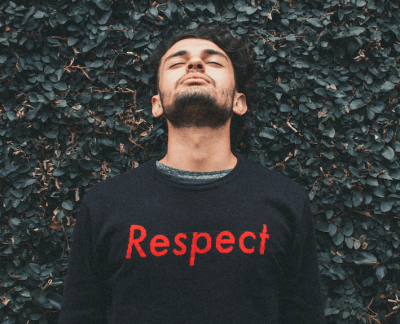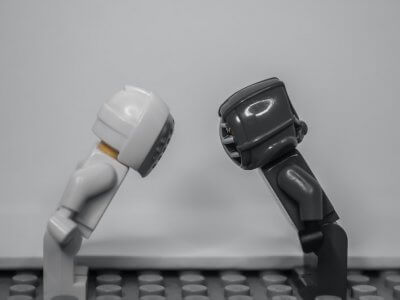How to Show Respect in Relationships – And Why You Might Have it Wrong
 Andrea M. Darcy
Andrea M. Darcy
The word ‘respect’ gets thrown around a lot. But what does it really mean to show respect in relationships?
“You don’t respect me”
It’s a common way to shut someone down in a discussion or argument. “Yeah well you don’t respect me!”
What we are really saying can be:
- I don’t feel listened to
- I want more attention
- you aren’t doing what I wanted or needed you to do
- I don’t trust you
- you are not living up to my expectations.
Here the phrase ‘you don’t respect me’ becomes a cover for the fact that we are not communicating our wants and needs well, if at all. And then we are blaming the other person for not being able to read our mind.
What is respect in relationships?
Research by psychologists at the University of California suggests that most people equate respect to two things — a feeling of belonging, and a need to have status. We want to feel we are valued, and we want to feel we have a place in the world.
But value and belonging don’t come from the above attitude that we ‘deserve’ attention. Nor do they come from bullying or manipulating others to meet our needs.
Belonging comes from shared experience. And feeling valued comes from a space of authenticity.
We accept the other person for who they are and what they offer, creating a safe space for them to grow as that person. Even as they recognise, accept, and create a safe space for you to be yourself and grow as a person.
How to show respect in relationships

photo by Kate Kalvach
In summary, respect requires committed, right action that creates belonging and shared value.
And respect really matters. The same research concluded that respect “plays an important role in shaping not only social engagement in group life, but also the self-esteem and physical well-being of the individual.”
Ingredients of a respectful relationship
The ingredients of a respectful relationship include:
1. Equality.
How are you similar? What do you have in common and share? The more we realise we are the same, the more we respect each other and create that feeling of belonging. Seeing differences creates space to think we are better than someone, or they are better than us. It creates alienation.
2. Good listening.
Good listening means we don’t interrupt. We don’t listen with half our mind when the rest plans what we’ll say next. We are fully present.
[Read our article, How to Listen Like a Therapist” to supercharge your skill!]
3. Clear communication.
This means stating our opinions and asking for what we want calmly, without resorting to manipulation or blame.
We don’t start sentences with ‘you’ but ‘I’. “You make me feel” is blame. “I feel this when you do that” is taking responsibility for your own feelings and communicating.
If we aren’t sure the other person understands us, we take the time to ask and get clarification. If we don’t understand what they are saying, we admit it, and ask for clarification.
4. Personal boundaries.
Thinking we have boundaries is useless. A boundary only becomes a boundary when we clearly communicate it.
 Personal boundaries are our proverbial lines in the sand. This is my limit, I ask you not to cross it.
Personal boundaries are our proverbial lines in the sand. This is my limit, I ask you not to cross it.
Let’s take lateness as an example. A boundary would look like calmly letting them know that if they are going to be late, they need to call or text you. Otherwise, you wait for 15 minutes, then leave. If this happens, if they are more than 15 minutes late without warning, then you do leave, and that’s the end of it. You don’t harp on about it in every argument.
5. Individual identities.
How can someone respect another person if they can’t even tell who that person is?
If you don’t maintain a sense of self in relationship, if you chop and change yourself to match a partner or friend, or change depending on who you are with? Then others will be confused.
Codependency blocks respect. When we are codependent we have a belief that we have to ‘win’ love so do so by being endlessly ‘helpful’ and pleasing. The trouble is that we then base our esteem on being useful to the other. Our identity is lost, and the other person starts to lose respect for us.
6. Accountability.
We all make mistakes now and then. We forget things, mix up dates and times, let each other down. But if you are constantly doing so, then it will be hard for others to respect you. They can stop feeling safe.
If you struggle with practicalities because of something like adult ADHD, it doesn’t mean you can’t have a respectful relationship. It means you need to be honest about the struggle and invest in a lot of communication and honesty.
7. Honesty.
Respect can’t grow if we are pretending to be what we aren’t and always just letting the other down, or are so stressed by a lie we aren’t fully present.
8. Trust.
Trust takes time to grow. But the more we work to be trustworthy, the more we gain respect. Mistakes might happen. But if they do, we admit them, and ask how to make amends.
An underestimated ingredient of trust is acceptance. We trust others when we know they accept us as we are. And we are more likely to work to be trustworthy if we feel accepted over judged and monitored.
Simply can’t respect each other?
Try really hard but they just do things that you don’t approve of? Or vice versa? Often it’s a case of mismatched values. We aren’t all made to be friends or partners.
Who cares if you like the same type of music if one of you believes in stability and the other in adventure? And if you are obsessed with honestly and your partner values privacy, then you’ll constantly be clashing.
First spend time identifying what your values even are. Not the values of your parents, your peers, or your partner, but yours. Then make those values clear through the choices and goals you make, and you’ll naturally earn more respect and attract those who share your values.
The main reason nobody respects you?
Try your hardest to be a trustworthy, open person, but feel like everyone constantly disrespects you? Don’t show up when you make plans, seems to forget about you, don’t listen to you?
The big question to ask here is, “Do I respect myself”? Run through the list above. Are you honest with yourself? Do you trust yourself, are you accountable to yourself, do you do what you tell yourself you will? Or are you constantly letting yourself down, and lying to yourself?
Other people react to the cues we unconsciously give them. They learn how we are willing to be treated and what we will put up from from us. A classic example is someone who always jokingly puts themselves down. They tend to then find other people criticise them, too.
Need help respecting yourself and others? We connect you to a highly-regarded team of London talk therapists. Or use our booking platform to find UK-wide therapists and online counselling you can book from overseas.
Still have a question about how to show respect to others? Post below. Note we are unable to provide free counselling and all comments are moderated.

Andrea M. Darcy is a mental health and wellbeing expert and personal development teacher with training in person-centred counselling and coaching, as well a popular psychology writer. Follow her on Instagram for useful life tips @am_darcy





Thanks for this wonderful piece. It made me now understand why things have been different in my relationship lately. This is so helpful.
I don’t feel respected by anyone at all. I’m surrounded by people who do bad things to me, if I confront them, they’ll try to make me feel like I’m in the wrong by telling me “I get offended easily” or dismiss it as “petty things” or berate me for being “angry and upset”. Yet constantly expect me to over empathise with them, see things from their perspective always and always change my perspective to agree with them plus take their feelings into account. According to them by their actions, my feelings aren’t as important as theirs. Ever. I’m tired of it.
Glad to be of help!
Hi there. Sorry to hear you are struggling so much with relating to those around you. Sounds like the way you see things and the way everyone else does is very different. Which is indeed exhausting and lonely. This would be a great thing to discuss with a therapist, if you had the courage. Together you can look at what that is about, at how to share your view in ways that get heard, and at how to find friends that you like. If you are on a low budget, we have an article on how to find free to low cost therapy here http://bit.ly/lowcosttherapy. Best, HT.